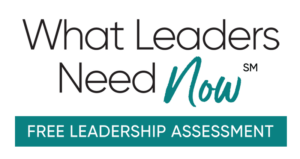Have you recently heard (or spoken) the phrase, “There’s a lot of fear out there”? I have heard it a lot, though I’m in the unique position in which people often confide in me the conversations they have only with themselves in the middle of the night. As we move into this year, 2024, I marvel at the range between optimism and gloom about the year ahead, yet regardless of where one’s macro-outlook lies, personal fears abound.
Fear is often hovering at the edge of life’s conversations, inviting us in. And I believe that the greatest danger we face now is withdrawing, whether in the context of something as intimate and precarious as raising a teenager or nurturing a marriage, or something as easy to dismiss as politics today. Do you recognize the danger in withdrawing from this conversation about fear in the workplace? Now is not the time to turn away from unpleasantness. Now is the time to engage.
What we usually think of as fear is actually our response to the presence of fear; an increased heartbeat, growing anxiety, and panic are all effects of fear, not fear itself. Fear can cause hesitancy, loss of confidence, and fragmentation, but those are results of fear that has not been fully faced. Fear is an old word that derives from the same roots that give us “fare,” as in “thoroughfare.” Although it often causes people to run away from troubling situations, at a deeper level, fear means “to go through it.” The hidden purpose of fear involves bringing us closer to natural instincts for survival, but also for awakening inner resources and sharpening our intelligence when faced with true danger and the basic need to change.
—Michael Meade
In my book, What Leaders Need Now, I write about compassion, courage, and humility. A way to summarize the three as leadership imperatives during tumultuous times might be this: Leaders must demonstrate the compassion to recognize what people are going through, the courage to listen and discern right action, and the humility to expose one’s own vulnerabilities.
A client recently told me of a talk he attended given by Brené Brown in which she made the sharp statement: “People are not okay.”
I agree with Brown. People are not okay. And hearkening back to Meade’s point, the manifestations of unfaced fears—hesitancy, loss of confidence, and fragmentation—are the opposite of what we want and need in order to have highly cohesive teams doing creative, high-value work. What if, by helping those we lead (and ourselves perhaps) become awake to reality, we can draw forth the courage to transform that very reality?
Recently I had a conversation about fear on a long walk with fellow executive coach Wendy Battino of Live Your Adventure and the non-profit, Thrive Nation. She’s one of the most courageous people I know, so I asked her about fear, and how she works with it in herself and with clients.
Wendy had powerful, simple, and practical advice. She said, “First, you sit with it. Feel it. What is its message?”
Well, that first step is not an easy one. Feel your fear? It has taken me most of my life to fully accept and do that, in my body, completely. Wendy is correct. It’s the first step.
She went on. “Then you relax into it, and decide what’s next, in small chunks.” She said that there might be very clear next steps, actions to take. I related to this, as I recently did an exercise around some nagging fears and was astounded that I simply needed to take some actions that I had been procrastinating.
Wendy cautions that once you face your feelings of fear, you might need time. Time to feel now and evaluate options later. There may not be next steps for things to do, and there may not be resolution that’s obvious in the moment. I personally find it’s helpful to journal or talk about it with a trusted confidant.
I began this post with the premise that now is the time to engage in genuine conversations in the workplace. In doing so, inevitably, you will unearth fear. If you are a leader, the most important gift you can give others is to be fully awake and present, having faced your own fears.














